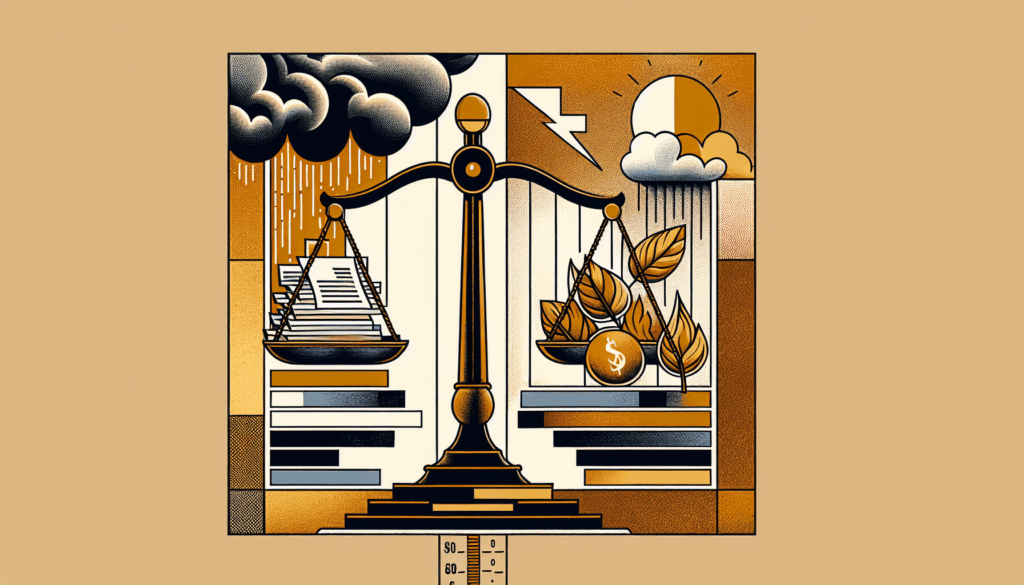In today’s digital age, the allure of making a living solely from your blog can be enticing. However, it is important to consider the potential downsides of relying solely on blog income for financial stability. While the freedom and flexibility of being your own boss is appealing, there are risks involved that may not be immediately apparent. It is crucial to explore these potential downsides to make informed decisions about your financial future.
1. Financial Instability
1.1 Inconsistent Income
Relying solely on blog income for financial stability can lead to inconsistent income. The revenue generated from a blog is often unpredictable and can vary from month to month. You may experience periods of high income followed by months with little to no earnings. This inconsistency can make it challenging to budget and plan for the future, leading to financial stress and uncertainty.
1.2 Vulnerability to Market Changes
Another downside of relying solely on blog income is the vulnerability to market changes. The blogging industry is constantly evolving, and market trends can shift rapidly. Changes in consumer behavior, emerging technologies, or even economic downturns can significantly impact the profitability of a blog. These external factors are beyond your control and can result in a decrease in traffic, which ultimately affects your income.
1.3 Lack of Diversification
Relying solely on blog income can also lead to a lack of diversification in your income streams. Depending solely on one source of revenue can be risky, as it leaves you vulnerable to any potential changes or disruptions in the blogging industry. Diversifying your income by exploring additional streams, such as affiliate marketing, sponsored content, or selling digital products, can help mitigate the risk and provide stability in times of uncertainty.
2. Long-Term Sustainability
2.1 Dependency on Traffic
One potential downside of relying solely on blog income is the dependency on traffic. Generating a steady stream of traffic to your blog is essential for income generation, as it directly impacts ad impressions and potential sales. However, maintaining consistent traffic can be challenging, as it requires continuous efforts in content creation, SEO optimization, and audience engagement. Any decline in traffic can directly affect your income, making long-term sustainability a concern.
2.2 Economic and Industry Shifts
The blogging industry is highly susceptible to economic and industry shifts. Economic downturns or changes in consumer spending habits can have a direct impact on the profitability of your blog. For example, during a recession, advertisers may cut back on their marketing budgets, resulting in lower ad rates and fewer sponsored opportunities. These shifts in the industry can make it difficult to sustain a reliable income solely from your blog.
2.3 Changing Audience Preferences
Audience preferences and interests can change over time, and relying solely on blog income means you are limited to catering to your current audience. If their preferences shift or new trends emerge, it can be challenging to adapt and meet their evolving needs. Failure to keep up with changing audience preferences may result in a decline in traffic and ultimately affect your income generation in the long run.

3. Limited Growth Potential
3.1 Income Ceiling
Relying solely on blog income may come with a limited growth potential. As a blogger, your income is often directly related to the size of your audience and the traffic your blog receives. While it is possible to increase your audience and traffic over time, there is often a ceiling to how much you can earn solely through blogging. This income ceiling can restrict your financial growth and limit your ability to achieve higher levels of financial stability.
3.2 Competitive Environment
The blogosphere is a highly competitive environment, with thousands of bloggers vying for attention and readership. Standing out and attracting a large audience can be challenging, especially in saturated niches. The competition for ad placements, affiliate marketing opportunities, and sponsored content deals can also be fierce. This competitive landscape can make it difficult to consistently generate high-income levels solely from your blog.
3.3 Scalability Challenges
Scaling a blog income can be challenging when relying solely on blog revenue. While increasing traffic and audience engagement is important for potential growth, there are limitations to how much you can scale your blog income independently. Scaling often requires exploring alternative revenue streams, such as creating and selling products or offering services. Relying solely on blog income may hinder your ability to pursue these scalability opportunities.
4. Time and Effort
4.1 High Workload
Running a successful blog often entails a high workload. Beyond writing and publishing blog posts, you may need to invest significant time and effort in research, content promotion, engagement with your audience, and networking with other bloggers. The demands of consistently creating high-quality content and engaging with your audience can be time-consuming and require substantial effort.
4.2 Time-Intensive Nature
Managing a blog and maintaining a consistent income requires ongoing time investment. The need to frequently update your blog, respond to comments, engage on social media, and analyze website analytics can be time-intensive. This time commitment can detract from other aspects of your life, such as personal relationships, hobbies, or pursuing other income-generating opportunities.
4.3 Diminished Personal Life
The time and effort required to solely rely on blog income can result in a diminished personal life. The demands of running a blog, continually producing content, and staying engaged with your audience can leave little time for self-care and leisure activities. The imbalance between work and personal life can lead to feelings of burnout, isolation, and reduced overall well-being.

5. Lack of Benefits
5.1 Absence of Employee Benefits
One major downside of relying solely on blog income is the absence of employee benefits typically associated with traditional employment. As a self-employed blogger, you are responsible for providing your own benefits, such as health insurance, retirement savings, and paid time off. This lack of benefits can be financially burdensome and limit your access to crucial protections and resources.
5.2 Self-Employment Taxes
As a self-employed blogger, you are required to pay self-employment taxes, which can significantly impact your overall income. These taxes include both the employer and employee portions of Social Security and Medicare taxes, which can amount to a substantial portion of your earnings. The additional tax burden can further reduce the financial stability and resources available to you.
5.3 Retirement and Savings
Relying solely on blog income can make it challenging to save for retirement or build long-term financial security. Without access to employer-sponsored retirement plans, such as 401(k) or pension programs, you are responsible for setting up and funding your own retirement savings. The fluctuating income nature of blogging can make it difficult to consistently save for the future, putting your long-term financial stability at risk.
6. Inconsistency and Uncertainty
6.1 Fluctuating Traffic
The inconsistent nature of blog income is closely tied to fluctuating traffic. Changes in audience behavior, search engine algorithms, or competitors’ activities can all impact the traffic your blog receives. These fluctuations can be unpredictable and lead to significant variations in income. Relying solely on blog income means dealing with this inherent inconsistency and the uncertainty it brings.
6.2 Dynamic Market Trends
The blogging industry is constantly evolving, with new trends and technologies emerging regularly. Staying ahead of these dynamic market trends can be challenging, especially if you solely rely on blog income for financial stability. Adapting to these trends and keeping up with the changing demands of your audience requires continuous learning and flexibility.
6.3 Unpredictable Future
The future of the blogging industry and the stability of blog income are unpredictable. Changes in consumer behavior, technology advancements, or shifts in the media landscape can impact the profitability and viability of your blog in the long term. Relying solely on blog income means accepting the inherent uncertainty and taking proactive measures to adapt and diversify when necessary.

7. Stress and Burnout
7.1 Pressure to Continuously Produce
As a blogger relying solely on blog income, there is significant pressure to continuously produce high-quality content. The need to consistently publish new posts, engage with your audience, and stay relevant can lead to added stress and burnout. This pressure to constantly create can take a toll on your mental and emotional well-being.
7.2 High Expectations and Comparison
The blogging industry can be highly competitive, leading to high expectations and comparison. Seeing other bloggers’ success and constantly comparing yourself to their achievements can create a sense of inadequacy and added stress. The pressure to meet high expectations and achieve similar levels of success can contribute to burnout and negatively impact your overall well-being.
7.3 Mental and Emotional Strain
The demands of running a blog and relying solely on blog income can result in mental and emotional strain. The constant need to stay motivated, deal with criticism and negative feedback, and navigate the challenges of the industry can take a toll on your mental health. It is essential to prioritize self-care and seek support to mitigate the potential negative impact on your well-being.
8. Technical Challenges
8.1 Website Maintenance
Maintaining a blog involves technical challenges, particularly in website maintenance. Ensuring that your blog is secure, up to date, and user-friendly requires ongoing attention and expertise. Dealing with website issues, resolving technical glitches, and staying on top of best practices can be time-consuming and add to the overall workload of managing a blog.
8.2 SEO and Algorithm Changes
Search engine optimization (SEO) is crucial for driving organic traffic to your blog. However, SEO algorithms are constantly evolving, requiring you to adapt and optimize your content accordingly. Keeping up with SEO trends and algorithm changes can be challenging, especially if you lack the necessary technical knowledge or resources.
8.3 Malfunctions and Technical Issues
Technical issues and malfunctions can occur unexpectedly. From website crashes to broken links or issues with ad placements, these technical challenges can disrupt your blog’s functionality and affect user experience. Dealing with these issues can be frustrating and time-consuming, taking valuable time away from content creation and income generation.

9. Limited Control and Autonomy
9.1 Adherence to Platform Policies
Blogging often involves using platforms such as WordPress or Blogger, which have their own policies and guidelines. Adhering to these platform policies may restrict your ability to fully exercise your creative freedom or monetization strategies. Relying solely on blog income means accepting the limitations imposed by these platforms and complying with their rules.
9.2 Dependence on Advertising Networks
Many bloggers rely on advertising networks to generate income through display ads. However, these networks often dictate the type and format of ads displayed on your blog. Depending solely on blog income means being dependent on these networks and their decisions, which may not always align with your preferences or audience interests.
9.3 Lack of Editorial Independence
Relying solely on blog income may limit your editorial independence. When monetizing your blog through sponsored content or affiliate marketing, you may be required to promote products or services that may not align with your values or audience’s interests. Balancing the need for income with maintaining editorial integrity can be a challenge when relying solely on blog income.
10. Potential Reputation Risks
10.1 Negative Feedback and Criticism
Publishing content online opens you up to potential negative feedback and criticism. Relying solely on blog income means putting your reputation at risk. Negative feedback, whether warranted or not, can tarnish your reputation and affect your ability to attract and retain readers and potential income opportunities.
10.2 Ethical Dilemmas
Blogging for income can sometimes involve ethical dilemmas. For example, you may face conflicts of interest when writing sponsored content, balancing your authenticity with the need to generate income. These ethical considerations can impact your reputation and potentially affect your long-term financial stability.
10.3 Tarnished Brand Image
Your blog’s brand image is crucial for attracting and retaining an audience. Relying solely on blog income means running the risk of tarnishing your brand image due to negative experiences, controversies, or missteps. Maintaining a strong and positive brand image is essential for long-term success, and any damage to your brand can impact your income and overall financial stability.
In conclusion, while relying solely on blog income may offer certain advantages, such as flexibility and creative freedom, it is important to consider the potential downsides. Financial instability, limited growth potential, lack of benefits, inconsistency and uncertainty, time and effort demands, technical challenges, limited control, reputation risks, and stress and burnout are all factors that should be taken into account when solely relying on blog income for financial stability. Diversifying income streams, taking care of your well-being, staying adaptable, and keeping a long-term perspective are key to mitigating these downsides and achieving sustainable financial success as a blogger.



